5 Questions With UC Davis MBA Admissions Senior Director Andrea Shaw

In our latest installment of the MetroMBA “5 Questions” series, we speak with Andrea Shaw, Senior Director of Admissions at the UC Davis Graduate School of Management. Shaw discusses the tight-knit culture of the UC Davis MBA program, what students can expect, and what qualities define the program.
How does UC Davis help MBA applicants who don’t come from a traditional business or quantitative background?
“Students come to us from across industries, functions, and from around the world. We pride ourselves on being a tight-knit and collaborative community where conversations directly happen between faculty, staff, and students. Our curriculum also allows students to choose between many different career paths especially given the connections we have across other UC Davis schools.
For students coming from a non-business background or who are nervous about starting, we’re a school that really fits. Many schools have 600 students in a full-time program. We only have 50 students. That allows us to personalize the journey of each student.
Also, UC Davis doesn’t believe in just throwing our students into the program. We get to know our students and their needs—what they’re looking for, their strengths, weaknesses, etc. Part of that knowledge comes from our highly robust orientation where we spend almost a month before school starts to really engage with our students.
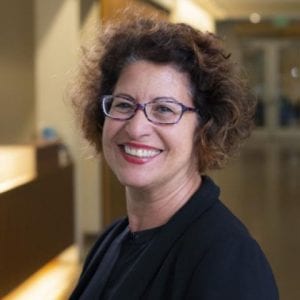
Andrea Shaw, Senior Director of UC Davis Graduate School of Management Admissions
During orientation, we spend a tremendous amount of time learning about our MBA class. There’s a significant career focus with discussion topics focused on networking, resume building, LinkedIn, etc. However, what the orientation is most known for is helping our students understand their emotional intelligence and develop their story through exercises and experiential learning.
Students have said in surveys that it’s the orientation that solidifies that they’ve made the right decision to come here. Those first few weeks are critical for setting them up for success.”
What type of culture defines UC Davis?
“The two words that continually come up from students, alumni, and faculty are “kind and compassionate.” We are driven toward success, but nice. It’s the idea of compassionate leadership, which research has shown to be necessary for true business growth. We even have an entire series that students can take to develop these skills, including awareness of themselves and others. Kindness and compassion are woven into every aspect of our culture, starting at the top with our dean.
Our culture is also defined by our location in a college town instead of a city. I love Davis as a city, community, and a place to go to college. It’s safe, comfortable, and all the energy revolves around the college.
We’re also really focused on what we do best as a university—biotechnology, sustainability, agriculture. Those sorts of segments and industries are very tied to our culture, university, and research. So, someone interested in Wall Street finance might not fit as well as someone interested in biotech.
Finally, because we’re a small community, you can really stand out. There are not a lot of politics to hold you back. You can get very involved, and there are fewer people vying for the same positions, so you can do as much as you want. This is highly beneficial for students who have a particular passion that they want to explore. For example, I know an MBA student who started a Women in Leadership organization because that was something she was passionate about, and it happened in a few conversations.”
Can you describe the qualities that UC Davis students possess?
“Other than the typical GMAT scores, GPA, and years of work experience, we look for applicants who know what they want to do with their MBA. Candidates should have a focus for the post-MBA career while also remaining open-minded about new opportunities. After all, an MBA is meant to be a transformative experience.
We also look for highly competent individuals who are professional in their verbal and written communications with us. We pride ourselves on being able to find jobs for all our students, so there’s a benchmark we look for—well-rounded students that have many different qualities. Going back to this idea of collaborative and kind, we look for candidates who are good team players and who see the value of working in groups because we have a lot of group work.
Finally, we look holistically at the class and how everyone will learn from each other. We look for a diverse class with students from a wide variety of backgrounds and industries. Everyone should be unique while still representing the essential qualities we love: kindness, compassion, and collaboration.”
If you could give one piece of advice to an MBA applicant interested in UC Davis, what would it be?
“Confidence! So much of what MBAs lack is confidence. The problem is that if you don’t think you can succeed, you won’t.
When you fill out your application and come in for your interview, we want confidence. Confidence is doing your research (knowing UC Davis), knowing who you are, and knowing your story. It’s also about being authentic. All of that leads to being confident in who you are and what you want. That will come across with us; it will come across anywhere.

“Confidence! So much of what MBAs lack is confidence. The problem is that if you don’t think you can succeed, you won’t,” Shaw says.
Remember, first impressions matter. That’s where that confidence helps too. If you come into a situation confidently, those first impressions are strong.”
What is your favorite San Francisco-focused business blog/website?
“I would say for applicants who are looking at schools in the Davis area, Metro-Edge.org is an excellent website. This is a website for young professionals in the Sacramento area. You’ll find events, gatherings, news, and more. It’s really focused on change and responsibility, and that’s great.
I also have to give a little plug to all of our social media accounts. Follow us on LinkedIn, Twitter, and Facebook for the latest news and insights. We also have MBA Showcase days coming up on January 26, February 9, and Feb 23.”
Drexel LeBow MBA Admissions Answers 5 Questions
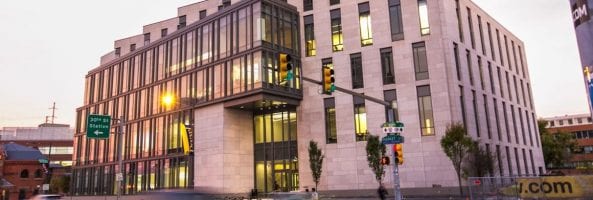
In our latest installment of the MetroMBA “5 Questions” series, we speak with Kate Sonstein, Associate Director of Graduate Recruitment & Admissions at the Drexel University Lebow College of Business. Sonstein discusses the importance of experiential learning and the quality of the students, staff, and faculty at LeBow.
1. What advice would you give an MBA candidate interested in Drexel LeBow?

“There are so many great things to think about when coming back to get your MBA, and sometimes it can be overwhelming. My best advice includes two simple things: be yourself and put your best foot forward on your application.
It’s important that you’re true to your personality and qualities in the admissions process because you are looking for an MBA that is the best fit for you, not your friend or colleague. You are on a search to find a home for the next 1.5-2 years of your life, and it is important that the MBA you select meets your individual needs at an academic, personal, and professional level. Otherwise, you could end up with a program that does not provide the type of interaction that is the best fit for you.
You also need to gain an understanding of the program and school where you are applying and demonstrate that in your essay and communications. Don’t just Google a few classes and stick them in your essay—believe me, we can tell. Big tip: spell check everything! And make sure your recommenders know why you are applying so they can write you an impactful letter. The best applications are those that are unique and showcase your strongest qualities, but also those that are genuine.”
2. What is Drexel LeBow’s greatest asset and what do you wish MBA students knew more about?
“Drexel LeBow is a community of ambitious, hard-working people who are striving to be the brightest and the best in their field. At Drexel LeBow, we are your greatest asset—our faculty, both with high impact research and industry collaboration; our staff, including our experienced career services team and involved college leadership; our advisors, guiding you through your experience every step of the way; and our students, go-getters always striving to be the best in every aspect of their experience.
I think our MBAs are still learning more about our newest feature in the curriculum: graduate minors. Graduate minors at Drexel are an opportunity to build an additional functional area of study at the graduate level through courses offered in other subject areas. Minors are offered across the university in over 50 different disciplines including data science, health administration, project management, and business analytics management. Minors can be built into the Drexel LeBow MBA plan of study without any additional courses—students simply put their 18 free elective credits towards their minor.”
3. What opportunities, outside of the classroom, does LeBow offer MBA students to get hands-on experience?

“Hands-on experience is crucial to the graduate experience, particularly in an MBA program. At LeBow, both our full-time and part-time students have the opportunity to participate in experiential learning opportunities, regardless of what other commitments they manage outside the classroom.
Consulting courses and projects are a key aspect of experiential learning at LeBow. Our students work with many industry partners through our Business Solutions Institute to solve complex business problems, working with decision makers and company leadership alike. Students can opt to work with a for-profit or not-for-profit company in a consulting course, or work on a consulting project through the Institute.
LeBow also offers the opportunity for residency-based courses, both domestically at one of our two Pennsylvania campuses or internationally. Domestic residencies are offered based on topical learning, such as Six Sigma or Negotiations for Leaders, or as a consulting course option. Our international residency course includes 10 weeks of study about a specific foreign market, and then concludes with a trip to that country (or countries) in the last week of term.”
4. How does LeBow support its MBA students for post-graduation?
“Throughout the MBA experience, our Graduate Career Services Team works closely with all our MBAs, regardless of their specific career goals. Opportunities including workshops, one-on-one coaching, and industry engagement events are integral to the MBA experience.
As an alumnus, we also strongly encourage involvement and engagement with the College and our current students. In addition to our University and College level alumni groups, we have the Drexel LeBow Graduate Alumni Association for our MS and MBA alumni that is quite active. The group hosts a number of events each year, including our signature night of Alumni Networking each April.
Alumni also have lifetime access to our Graduate Career Services Team. The team consists of a variety of professionals with different backgrounds and expertise who are available as they transition to multiple roles throughout their career, or simply for professional development advice and feedback. We encourage our alumni to be as involved as possible—it’s all about who you know!”
5. What’s your favorite online blog that you would recommend for students?

Overlooking the Schuylkill River, between West and Center City Philadelphia.
“I’m not originally from Philadelphia, so some of my favorite blogs are about Philly and all the amazing things it has to offer. My [number one] choice is always Uwishunu.com (if you say it out loud it sounds like “You wish you knew”) and it always delivers. They do weekly and monthly city happenings and highlight some of the best events and food spots in the city.
Our main campus is also located in the University City area of Philadelphia, and they have a great blog that I love to use to keep up with our neighborhood. Philly is a city filled with culture, history, art, and some of the best food you will eat so there is always something to explore!”
Georgetown McDonough MBA Admissions Answers 5 Questions

In our latest installment of the MetroMBA “5 Questions” series, we speak with Shelly Heinrich, Associate Dean, MBA Admissions and Director of Marketing at Georgetown University’s McDonough School of Business. She was kind enough to respond to our questions and share insight into what it’s like to attend McDonough for an MBA.
1. How does Georgetown McDonough help MBA students pursue their special interests?
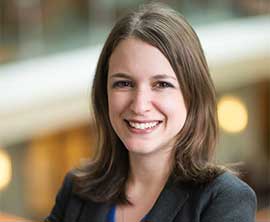
Shelly Heinrich, Associate Dean, MBA Admissions and Director of Marketing
“One of the reasons Georgetown McDonough stands out is because our students have diverse industry interest areas. We are not a school that places half in consulting and half in finance. While these certainly are the largest areas our students pursue, close to 53 percent are seeking careers in the following industries: technology, consumer products, healthcare, hospitality, manufacturing, nonprofit/social impact, real estate, and government. Technology, in particular, is our third highest career placement industry.
Another way students can pursue special interests is with our customizable curriculum. After students in our full-time and Flex MBA complete their core, they can choose from over 100 electives and don’t have to declare a concentration. We believe this is key because every job requires people to wear multiple hats and have multiple skill sets. So, if we were a school that forced students into certain classes, they wouldn’t be able to build a skill set that addresses the multiple knowledge gaps they are seeking to fill.
Additionally, MBA students can leverage the rest of Georgetown University, taking up to 12 credit hours of electives at another Georgetown graduate program or even 6 of those 12 credit hours at partner institutions in the DC metro area.”
2. What makes Georgetown McDonough a special place for you?
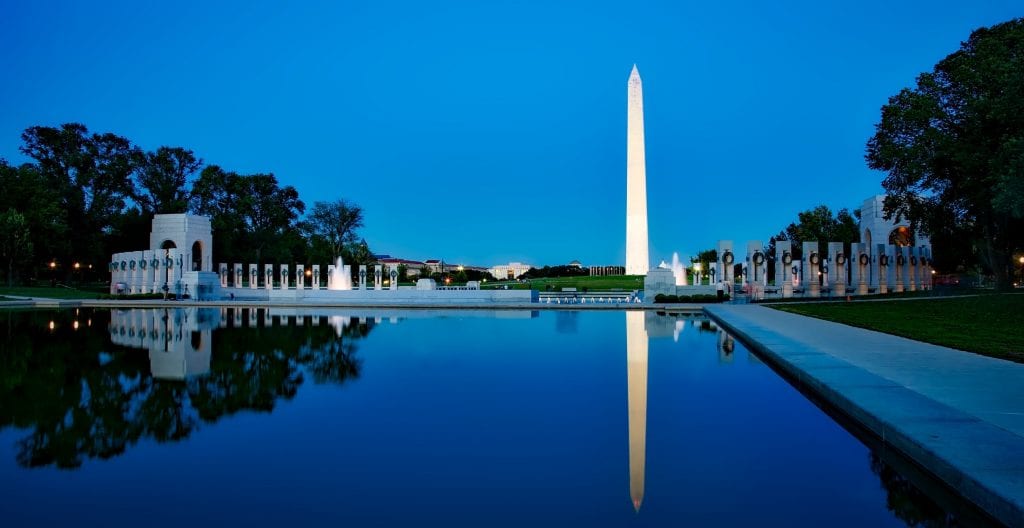
Overlooking the Washington Monument, located just one mile away from the Georgetown University McDonough School of Business campus.
“I experienced what makes Georgetown McDonough special even prior to starting to work here over four years ago. I’ve been living in the DC area for over ten years now and have worked at four other business schools. Throughout my professional and personal life, anytime I engaged with someone who worked, taught, or went to school at Georgetown McDonough, their eyes lit up or ‘sparked’ when talking about their experience. They spoke about their time as if they wanted to be back on campus, reliving their experience. When I received the offer to work here, a former staff member of McDonough reached out to me with congratulations and encouragement and said, ‘I loved my time there. It’s such a special place, and you’re going to love it.’
From day one, I have understood the spark. We have a phenomenal community. Students are high caliber, love their community, and embody the Jesuit values of men and women in service to others. Faculty and staff are committed to the continued growth of the program, and the evidence of this is our continued rise in rankings, the profiles of our incoming students, and our employment results. Also, our alumni are committed to giving back and helping fellow Hoyas.
Four years later, I still love coming to work every day. The buzz and energy of the Hariri building is invigorating and I am always excited to celebrate the weekly or even daily accomplishments of our community.”
3. What does your ideal MBA candidate look like?
“Our ideal candidate has executive presence, grit, diverse personal and professional life experiences, a global mindset, and a generosity of spirit. We want students who will come to Georgetown McDonough and leave a mark, finding their niche in the student community and leaving a legacy that will be experienced by future cohorts and classes.
But, to answer the question that your readers are likely looking for, we certainly look for students with a class profile similar to our recent incoming class. These are students with a strong academic background, professional and personal experiences that can add value to the classroom conversation, and a strong commitment to understanding and appreciating a diverse classroom experience. Our incoming Full-time and Evening MBA class represented over 40 countries and 17 industry backgrounds. The ideal candidate comes in wanting to learn from all the various backgrounds of students.”
4. Are there any new program, centers, faculty members, or events you can talk about?
“The Flex MBA program—the next evolution of our Evening MBA—will start in fall 2019. This program retains the strong assets of our highly ranked part-time MBA program while infusing newly added areas of flexibility.
We will retain an identical curriculum and degree as our full-time MBA and access to the same cohort format. The new aspects of the program include a Saturday elective and hybrid elective options, in addition to the current evening elective offerings. Hybrid electives allow for a mix of on-campus and virtual sessions to provide flexibility to students who may travel for work or who need options to commute less to campus. Additionally, there will be additional opportunities to take our Intensive Learning Experiences, which are 1-2 week intense electives where you complete an entire elective on a host of special topics in a condensed amount of time. Finally, we’re now allowing students to transfer electives of graduate coursework if they have not been counted toward another graduate degree.
We’ve seen strong interest in this program and look forward to the inaugural cohort next fall.
We recently launched a new Certificate in Consumer Analytics and Insights that provides students the opportunity to understand how consumers make decisions via the analysis of consumer data. For students wanting to hone their analytic skills, this is a very relevant certificate. Additionally, the HoyAlytics, student data analytics club is celebrating its one-year anniversary and has provided students with workshops in such programs as Tableau, R, SAS, and Excel.
Working with others across the university, Georgetown McDonough has launched a program to transform the lives of a highly select group of District residents released from local correctional facilities who show strong potential to become successful leaders and role models in their communities.
Through a combination of education and partnership with local employers, the university’s new Pivot Program aims to prepare participants for positions as both entrepreneurial leaders and productive employees.
The Pivot Program represents a collaboration among Georgetown’s Prisons and Justice Initiative, Georgetown College, and the McDonough School of Business, with the support from the Mayor’s Office on Returning Citizen Affairs and a $400,000 grant from the U.S. Department of Commerce’s Minority Business Development agency. In addition, the D.C. Department of Employment Services will provide stipends to our participants.
Georgetown designed the Pivot Program to break that cycle and recapture this untapped human capital. This transition program offers a non-credit-bearing certificate in business and entrepreneurship designed specifically for a cohort of up to 20 returning citizens, to be known as Pivot Fellows.”
5. What’s your favorite DC parade/event that every student should attend?

“I love the Embassy Open House Weekends in May; there are usually two consecutive weekends. Most embassies open their doors for a weekend of food, dancing, and cultural activities specific to their country. You can walk from embassy to embassy for an entire day of cultural immersion. It is something unique to D.C. that you wouldn’t get anywhere in the world. We have over 177 embassies in D.C. which is representative of what a global city we are.
Additionally, every student has to watch the 4th of July fireworks on the National Mall at least once while here. It is truly an U.S. American tradition and patriotic experience. Hot dogs, music, blankets, picnic baskets, and red, white, and blue.”
NYU Stern Director of Admissions Answers 5 Questions
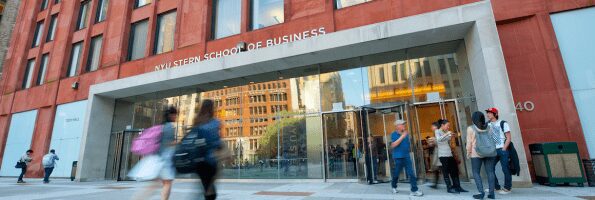
In our latest installment of the MetroMBA “5 Questions” series, we speak with Lauren Calio, Director of MBA Admissions at NYU Stern. She was kind enough to respond to our questions and share insight into what it’s like to attend Stern for an MBA.
1. How would you describe the culture of NYU Stern? Is it more collaborative or competitive?
“The culture at NYU Stern is absolutely collaborative. So much so that “Collaborative Community” is one of our four core values. We believe that collective efforts lead to greater success both inside and beyond the classroom. As an example, we often hear stories of students helping their classmates prepare to interview for roles that they themselves are also interviewing for. If they are not hired for a role, they want another Sternie to get that position. Another one of our core values is ‘IQ + EQ.’ Because we seek exceptional individuals with not only intellectual strengths but also high emotional intelligence, a collaborative spirit and desire to drive change together is ingrained in our student body, faculty, and administrators.”
2. What type of student is the best fit for NYU Stern’s MBA program?
“Students come to Stern with a passion for the School and experience from a wide range of industries and functions, and they aspire to land in a variety of post-MBA roles. Some are career switchers, others are not. Regardless of their experience or career goals, applicants should be able to highlight and quantify their accomplishments and clearly explain to the Admissions Committee their career goals and how they plan to achieve them. Beyond work experience and goals, a common thread among our students is their high emotional intelligence or EQ, and engagement in our collaborative community. We also pride ourselves on being a school where everyone can be themselves. Our students’ interests outside of the classroom are also vast, as evidenced by our 30+ student clubs serving professional, affinity, sports, and special interest areas.”
YOU MAY ALSO LIKE: GMAT Scores, International Students Jump at NYU Stern
3. If there was just one piece of advice you could give to an MBA applicant considering NYU Stern, what would it be?
“Connect with the Stern community. Get to know our community and our culture by speaking to current students, alumni, and the admissions team; attend a class visit; explore campus by coming for a tour and information session. This will help you picture yourself at Stern. If you are not able to make it to New York, you can connect with our current students virtually. They can share their experiences and provide an honest perspective on how their time at Stern has helped them grow both personally and professionally.”

“If you are not able to make it to New York, you can connect with our current students virtually. They can share their experiences and provide an honest perspective on how their time at Stern has helped them grow both personally and professionally.”
4. How accessible are NYU Stern professors? Do they frequently serve as mentors?
“Stern professors are very accessible. We have over 300 faculty members across industries, which means that students can connect with faculty in the areas they are passionate about. Faculty members are available to students and are often involved with projects and experiential learning opportunities, what we call Stern Solutions, working alongside students. Our faculty include top researchers, four Nobel laureates, and senior business leaders, some of whom are working in industry by day. My advice to students is to take advantage of this accessibility to build relationships while you are at Stern that will extend beyond your time here. Make your professors a part of your network.”
5. Where can you get the best NYC pizza near campus and where’s the best coffee shop for studying?
“These questions come up frequently in our office, and every person has a different answer. Being in the heart of NYC, we are surrounded by an abundance of pizza places and coffee shops. One of my favorite places to sit and get a pie is Numero 28. Their pizzas come in different sizes (up to 29”!), and you can mix and match toppings. Kopi Kopi is a cute coffee shop on West 3rd Street, right near campus.”
5 Questions with the SMU Cox Assistant Dean of Graduate Admissions
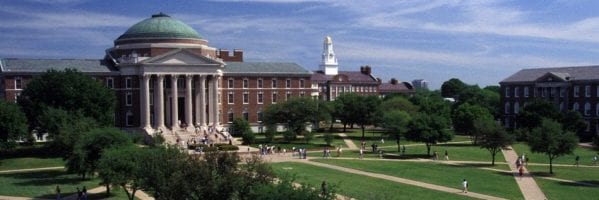
In our latest installment of the MetroMBA “5 Questions” series, we speak with John Roeder, Assistant Dean of Graduate Admissions at SMU’s Cox School of Business. He talks with us about inside details of the MBA program, pre-admissions tips, and the school’s beautiful campus.
Can you tell me something about the SMU MBA that I cannot learn unless I actually take part in the program?
“SMU Cox fosters a highly collaborative learning environment and connections to a network of 42,000-plus alumni around the world. From day one, SMU Cox MBA students join this community—a highly connected, active, and engaged group of students, alumni, and corporate partners that extend across the Dallas business community and beyond.”
What are you most excited about when it comes to the future of SMU Cox?
“The future of SMU Cox is bright and exciting. The Cox School is refreshing the curriculum, and infusing new elective courses into the MBA program to reflect the evolving needs of businesses today. Plus, we’re located in the heart of Dallas, a city on the rise! In fact, Forbes ranked Dallas the #1 best big city for jobs two years in a row.”
YOU MAY ALSO LIKE: Real Humans of the SMU Cox School of Business
What parts of the MBA program should more students know about before starting their graduate school career?
“Each year, applicants impress us with the high level of research they do on their own. Here are a few things we encourage students consider when searching for the right program fit.
- Research the curriculum: Is it flexible, customizable? SMU Cox offers four different paths to the MBA. Whether you pursue the degree as a full-time student or a part-time student, you have the flexibility to customize the coursework and choose electives to meet your needs.
- Explore experiential learning opportunities: There are incredible opportunities to gain technical knowledge and hands-on experience both inside and outside the classroom. At SMU Cox, all our MBAs have an opportunity to gain international business perspective through our Global Programs.
- Identify companies or industries where you have an interest in working: Research your target business school’s alumni presence and recruiting relationships with those companies. At SMU Cox, we have over 100 corporate partners and hiring companies actively engaged with our students.”
What do you think is the most important part of the pre-admissions process?
“A few things can really help a candidate stand out during the application process. At SMU Cox, we look for students who have demonstrated a drive for impact, both personally, and professionally. So, when building your application, take the time to sharpen your resume, and highlight quantifiable achievements. Leverage the essays to showcase your personality and motivations for pursuing the MBA. And finally, let us get to know you! Whether you join us at an information session, a coffee-chat, or simply set-up time to meet one-on-one with a member of our Admissions team, we’d like to get to know you personally.”
What is your favorite part of the SMU campus?
“One of the best aspects of our beautiful, tree-lined campus is its proximity to downtown Dallas. Our campus is located just miles from corporate headquarters, a flourishing art and museum district, a world-class sports arena that houses our local NBA and NHL teams, acres of outdoor parks and trails, and sits walking distance from both locally-owned and nationally acclaimed restaurants.”
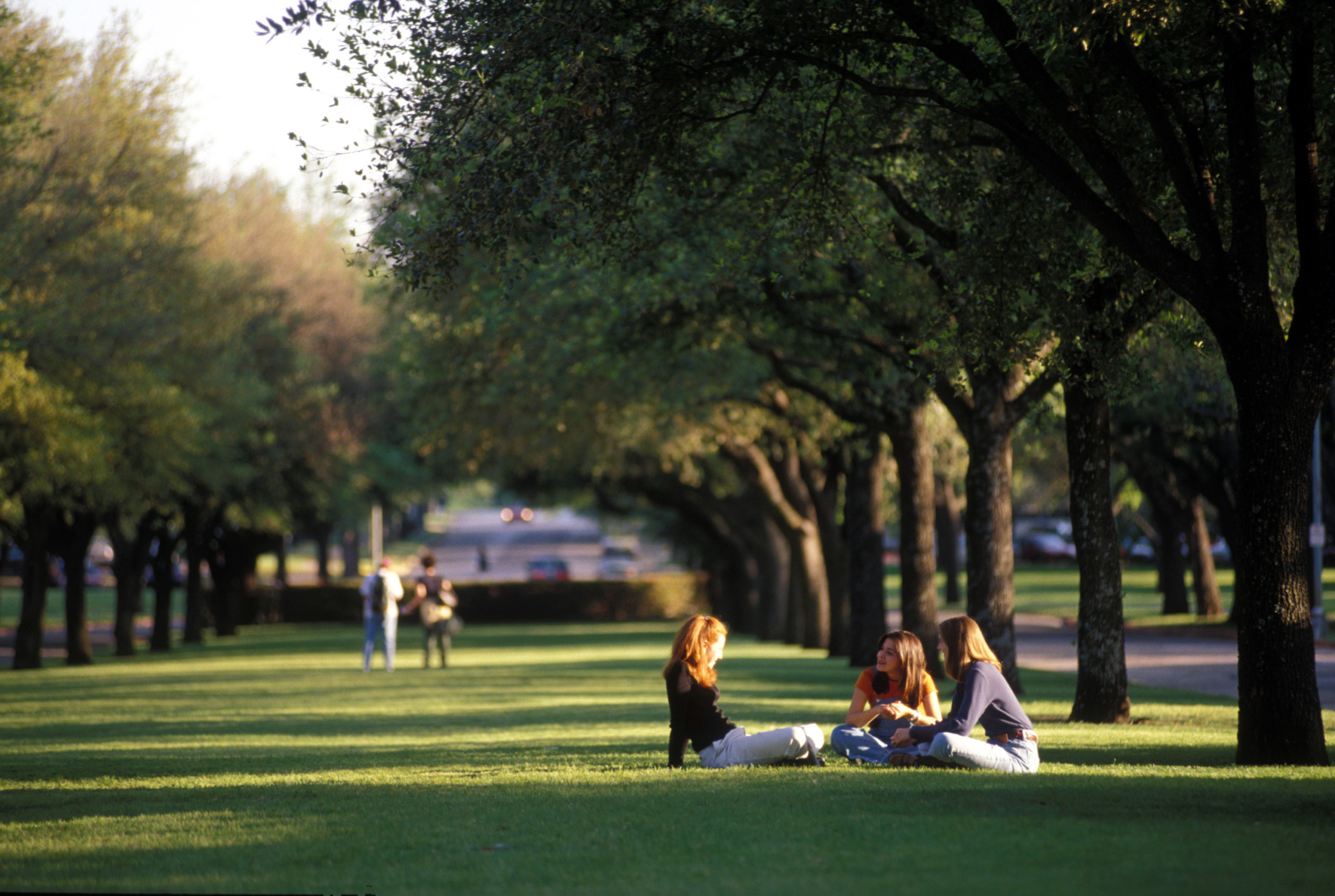
The Professional Grounds Management Society has previously awarded SMU the prestigious Grand Award for its picturesque campus / Photo via smu.edu
Click here for more information on admissions at the SMU Cox School of Business.
5 Questions With University of Georgia Admissions
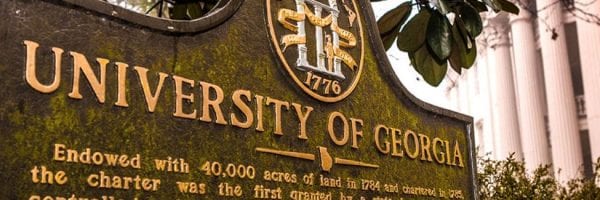
In the newest installment of the MetromBA “5 Questions” series, we speak with Patricia D. Zettek, Ph.D., Director of the Full-Time MBA Career Management Center at the University of Georgia Terry College of Business, and Deirdre Kane, Director of Full-Time MBA Admissions about the UGA experience, Southern culture, and more.
What is something unique about the Terry College of Business MBA experience that people may not expect?
“Candidates to our program are most often surprised by three main things:
1.) Our flexible curriculum
2.) Our personalized and customized approach to supporting our students, academically and professionally
3.) Our welcoming and diverse program culture.
We have years of experience and the strength and size of our alumni network (310,000 and counting) to support our students in being successful while in the program and after they graduate. Our career management staff knows our students well and this one-on-one attention makes a big difference by the end of the program. Students learn and practice skills they need to land their next job or internship, and also to manage their careers throughout their lives. Faculty get to know the students, and truly take an interest in their success.”
What kind of student is the ideal Terry College of Business MBA?
“We look for humility, self-awareness and the willingness to learn new things about themselves—people who have experienced a setback or two—and learned from it. The ideal candidate for the Georgia MBA program has more than just the great test scores and GPAs sought by all full-time MBA programs, we look for the students that demonstrate a roll up the sleeves and get things done attitude. These are the people who do well here.”
What do you find business school applicants often overlook during the pre-MBA process?
“I think some people limit their choices by looking only at certain things, rather than the whole picture. They may focus tightly on one factor—school rank, tuition cost, employer relationships, average salary—rather than fully thinking through what they want and need from their MBA experience. Visiting campuses, talking to current students and meeting members of the staff could offer a very different view than the one that takes into account only one or two factors. MBA programs vary widely and there is not a one-size-fits-all experience. Find a few that fit your needs and go after them.”
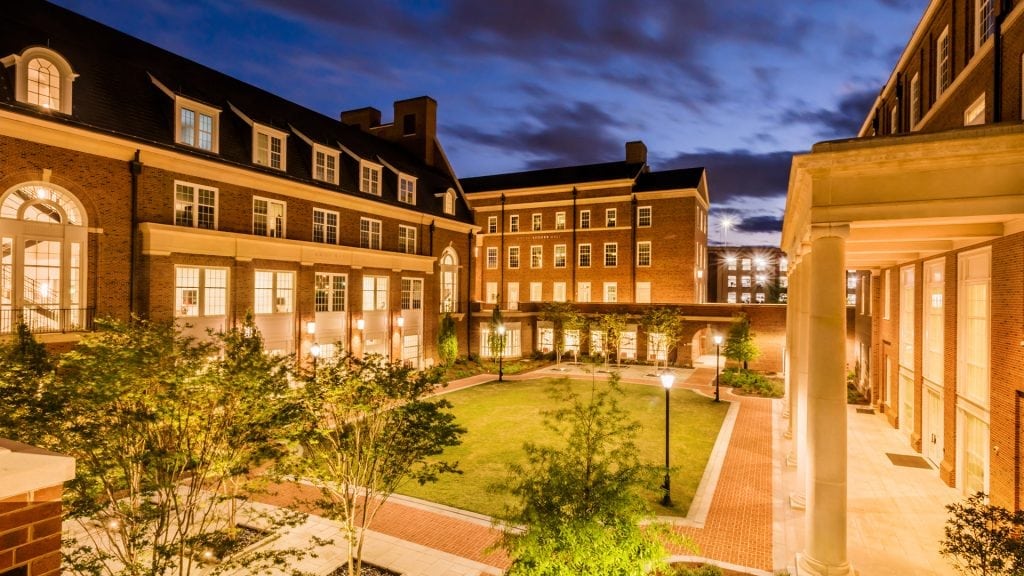
“We look for humility, self-awareness and the willingness to learn new things about themselves—people who have experienced a setback or two—and learned from it” – Patricia D. Zettek, Ph.D. and Deirdre Kane
What do you find most business schools are lacking?
“Lacking is a pretty strong word. I consider business school an excellent investment in a candidate’s future. I understand why you might ask though, because if you listen to the media, the MBA has been dying out since the 1940s, but that’s just not true! There continues to be a need for professionals trained to understand the complexities of our business environment and committed to doing things right. Overall MBA programs and program staff are committed to the success of their students and genuinely interested in providing their students with the best experience and the best opportunities.”
What is your favorite restaurant near UGA?
“I think Athens is one of the South’s most underrated food cities. We’re known for music and football, but not until recently have we been noticed for our food scene. Thanks to chefs like Hugh Acheson, who calls Athens home, we have many farm to table gems, like Last Resort Grill, The National, home.made, and Heirloom Café. And everyone should check out Weaver D’s, Ted’s Most Best, Clocked, The Grit, Taziki’s, and Viva Argentine! The list is long and there is something for everyone!”

Southern-inspired specialties are abound in Athens, Georgia, including at home.made, founded by New Orleans-born chef Mimi Maumus – Photo via homemadeathens.com
For more information on the UGA Terry MBA admissions, click here.
